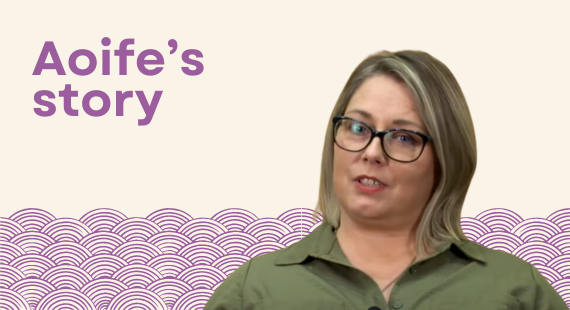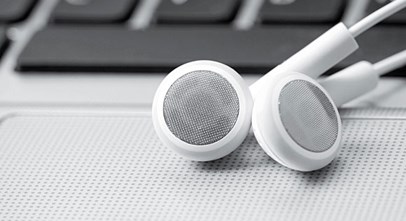
Aoife Cullinane shares her lived experience of mental health difficulty and recovery.
Journalist and broadcaster Dearbhail McDonald hosts an episode of RTÉ’s Brendan O’Connor Show with a focus on “second chances”. In the episode, she is joined by two guests to talk about the fresh starts they believe they got in life following different, significant experiences they went through.
One of her guests is Aoife Cullinane, a former service user of St Patrick’s Mental Health Services (SPMHS), who is an active advocate for people experiencing mental health difficulties. Aoife generously shares with Dearbhail and listeners her experience of a mental health difficulty and how life has changed since beginning her recovery journey.
Fearing stigma and judgement
Aoife explains that, in her late twenties, she realised she had a dependence on alcohol. She had been struggling for a long time and came to the realisation that she needed to quit alcohol. However, she says, “what I also thought was that, just by quitting alcohol, all my problems would go away, but it was actually only kind of the start of a long journey.”
It took Aoife about three years to admit that she had a dependence on alcohol for a reason. When she stopped drinking alcohol, she began having a lot of flashbacks to abuse that she had experienced when in her early years. She struggled to accept the trauma, but, as it emerged in her late twenties, the flashbacks became very bad over the course of those three years and began causing her to become unwell. However, this was something she found difficult to accept at the time; the fear of stigma – both from others and within herself – was running high.
“In those three years, I just experienced so much anxiety and depression, but I also experienced a real kind of resistance in myself to admit that I was struggling… I survived a suicide attempt. I was living with suicidal ideation during that time, but I was terrified that I would be called “crazy”, terrified of the stigma and the judgement”.
Taking first steps
Aoife talks about how she felt like she was in unfamiliar territory; she didn’t know where she was going to go. She did, at times, mention it to different people, but “no one really knew what to do about it.”
It was in 2012 that Aoife took the courageous step of going to her GP, who was extremely supportive. Her GP asked her what was going on, what it was that she was experiencing, and what she was living through. Aoife told her everything, and what the GP said next, for Aoife, was the start of getting the support she needed. Her GP told Aoife that this had gone on long enough and was no way to live. Aoife says, “I remember when she said those words, you know, I just started crying, and I was like “ok, send me wherever you need to; I’ll do whatever it takes”. I just wish that I didn’t have to get that bad.”
Beginning treatment
Aoife’s GP put in a referral to SPMHS. It was the first time Aoife had been referred for mental healthcare, having only gone to hospital for physical issues previously. She remembers going home and wondering if she should pack a bag or wait for an ambulance as she didn’t know what to expect. She explains that she since learned that, after a GP puts in a referral, the team in SPMHS examines referrals and works to identify the most appropriate service for the person. After a few days, she was contacted to say she would be going into hospital in a couple of weeks’ time. She says, “they kind of give you time to prepare, which was really interesting for me because, in that time, I just remember crying a lot and really feeling supported and like the battle is over: I’m going to get help.”
A few weeks later, Aoife came into St Patrick’s University Hospital (SPUH) on a Sunday. She remembers the experience of being in a mental health hospital being different to what she had expected. “I was probably thinking of things like One Flew Over the Cuckoo’s Nest and all these awful shows. I thought that there would be restraints. It was awful, the prejudices and stigmas that I had internalised, and it was nothing like that.”
Instead, Aoife remembers the nurses on her ward encouraging her to rest a lot when she first went in. She also felt a lot of ease with and support from the other people there. “I was on a women’s ward. There was a lot of supportive chats, cups of tea, sitting around in our everyday clothes… We did a lot of arts and crafts, lots of meditation, just relaxation, you know.”
Aoife’s recovery took time. Over the course of about two years, she received both inpatient and outpatient treatment, and she did go back into SPUH after her first time there. She explains that the support of family made a big difference in her going through her recovery: “I could just see the love that they had for me, and I remember thinking, god, you know, I just have to do this; please give me the strength to say “no more”. I’m not going to suffer any more.”
Another huge thing for Aoife was the realisation within herself that she didn’t deserve to suffer any more: “It was really accepting that it was not my fault, that there’s no shame in struggling in life and, ultimately, that I just wanted to get well.” She explains she has a huge amount of compassion in her life now, both for herself and for other people.
Living with purpose
After receiving care for her mental health, Aoife’s life changed for the better. She talks about making “a complete overhaul”, and feels her life now is very different to that of her first 30 years. Firstly, while Aoife had been in a job in financial sales, she didn’t return to the corporate world. Because quitting alcohol was a big change for her, lots of other things in her life changed too. She “ended up making a lot of community connections… getting involved in a choir, playing music, going to open mics”. Her social circles changed, and she began volunteering with the Simon Community Cork.
For Aoife, these changes were about finding purpose:
“I suppose, I just felt it was so important to be around things with purpose, because that really helped me to feel a value, and I think that’s a really key thing if people are struggling with their mental health.”
Being present, finding community and feeling connection to others are also really important to Aoife today. “I just live in the moment. I see the detail in everything. I really value human connection and just, again, the simple things, like nature, the turn of the seasons… I think being involved with community was a huge part of my recovery, because it is difficult, you know, and it’s nice to be with people who are also connecting with each other and trying to lift each other up, because it’s so important. You know, life is challenging on all levels, but yet we get to make it special by the people we have in our lives and living in the moment.”
Lifting the shame
Today, Aoife is grateful for the journey she made: “every day, I am grateful to be alive, and I’m grateful to be involved with community stuff. I’m grateful to have my voice… Every day is a blessing.”
She has finished a degree in counselling and psychotherapy, and hopes to start working as a lived experience educator so that she can “continue to lift that shame that people can internalise”.
For anyone going through a mental health difficulty now, Aoife urges them to seek support: “Please use your voice… Your GP is your starting point. It doesn’t need to get as bad for you as it did for me… Don’t leave it go because, the reality is, there’s so many supports out there and, even if you feel that there’s not, just find one person that can listen to you and believe that you can get better.”
If you're affected by any of the issues raised in this article, or if you are worried about your own or someone else's mental health, please know that help is available. You can find more information and supports below.
Hear more from Aoife
Aoife shared more of her experience in our Accept. Act. Adapt. webinar. This webinar brought together people with lived experience and members of our team here in SPMHS for an open conversation about how to accept your mental health, how to deal with stigma, and how to take action for your mental health.
You can watch the webinar below.

